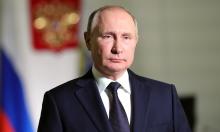Containment or concession: the eclipse of regime change
 Under the pervasive uncertainty about whether the general pattern of world politics will mark a restoration of multilateralism with American leadership or a drift toward multi-polarism, strategic options present themselves to the United States.
Under the pervasive uncertainty about whether the general pattern of world politics will mark a restoration of multilateralism with American leadership or a drift toward multi-polarism, strategic options present themselves to the United States.
Those options define the alternative goals for American foreign and security policy.
Making the American decisional position the major determinant of the pattern of world politics does not imply a preference for American power. It is simply recognition that the present global balance of power remains heavily weighted in favor of the United States, in the sense that other powers are primarily responsive to American behavior rather than autonomous initiators. The only exceptions are the Islamic revolutionary movements that cross-cut state power politics and are chronically disadvantaged by their failure to possess or be protected by a state apparatus.
Since the end of World War II, the strategic aim of the United States has been to be the military guarantor of the capitalist market system, gaining thereby the economic benefits that follow from performing the role of protector. Both the Cold War and decolonization forestalled the possibility of conquest, so the operative policy became regime change wherever the United States judged that its basic interest was threatened.
The utopia of American security policy is a world of "market democracies" with stable representative institutions, open to trade and investment, and policed by the United States. Short of that ultimate goal, any regime that plays ball with the market system and does not threaten other states within that system has been acceptable. In the worst case, there has been tolerance of dictatorships that oppress segments of their populations and engage in wholesale corruption -- a prescription for long-term instability.
Regime Change
Although the term "regime change" has only become current in the past decade with the rise of neo-conservative influence in American policymaking, the policy that bears its name has been operative for more than fifty years. One need only think of Iran, Guatemala, Chile, Grenada, Panama and Kosovo to grasp the consistency of that policy. Regime change will continue to be the desired outcome of American strategy, as long as the United States remains the major military power in the world. Whatever ideological differences that they might have, American security elites are united in the understanding that America's power advantage does not result from its economic strength or its cultural appeal, but from its credibility as a protector of the market system. Wealth and "soft power" are important, but they are not decisive.
The notion of regime change is elastic. At one extreme, it involves the outright removal and replacement of the policy leadership (government) of the target state, along with its administrative apparatus. This polar case applies to quasi-totalitarian regimes, such as Ba'athist Iraq, in which the ruling party has staffed the apparatus with its partisans. Comprehensive regime change involves military occupation of the target state, refashioning its constitution and administration, and making sure the new personnel are favorable to the market system and American security aims. It can be understood as nation rebuilding.
At the opposite pole from comprehensive regime change is influencing the government of the target state to alter its policies so that they fall into conformity with the American strategic design. During the diplomatic prelude to Operation Iraqi Freedom, President Bush at one point said that if Saddam Hussein disarmed voluntarily, his regime would have changed and a military intervention would not be necessary. As much of a stretch as Bush's statement might seem, it is analytically sound. The purpose of regime change is not the replacement of political and military forms (democratization), or even of personnel, but transformation of policy to suit American interests. If that result is effected by the target state's government, it is no longer an adversary.
Between the extremes of root-and-branch overhaul and persuasive instigation of policy change are all of the other means of effecting policy change from measures to remove governments by military action, through diplomatic and economic sanctions, to support of proxies oropposition movements. All of those tactics have been used, often in combination or successively, by the United States since World War II, and they are all still on the table, depending for their employment on America's capacity to exercise power.
The American experience of nation rebuilding in Iraq has shown that the United States is ill-equipped to undertake comprehensive regime change successfully in a former quasi-totalitarian state. Although Iraq is still a "work in progress," it now appears unlikely that it will become a stable market democracy in the near to medium term. The limits of American power revealed by the Iraq experience have effectively removed comprehensive regime change from the table for the present and have impaired the effectiveness of more modest measures. The United States would still prefer regime change in states such as Iran and North Korea, but it will probably have to settle for less.
Containment
Short of regime change, the most plausible apparent option is containment, which has also played a significant role in American security policy since World War II. Containment - keeping the target state within bounds so that it does not expand its military capability and threaten other regimes - is a fall-back position that cedes to regime change when a more favorable configuration of power develops. For example, the containment strategy against the Soviet Union was supplemented by support of anti-Soviet forces in Afghanistan, which hastened the collapse of the Soviet system.
The most important consequence of the Iraq intervention for American power is the release of tendencies toward multi-polarism on the part of great powers like China, Russia and -- to a lesser extent - the Franco-German combine. The second global consequence is the increased difficulty of containing states and movements that fall outside the order of globalization - specifically, the two other members of the "Axis of Evil" - Iran and North Korea - and the stateless movement of Islamic revolution.
Containment of a target state is relatively easy when the United States has overwhelming military superiority and international support, as was the case after the Gulf War, despite the progressive tattering of the sanctions regime. It becomes much more difficult when those two conditions are not present and the target state moves to expand its military power and/or to mix in the affairs of its neighbors. Such is the case for Iran and North Korea at present. When target states seek to change the balance of power in their favor, the United States is faced with the choice of trying to repel the moves or to make concessions that erode containment.
Iran
Iran is currently the greatest test of American security policy. The recent face-off between Iran and the International Atomic Energy Agency, in which Iran was able to avoid having its nuclear program become an issue for the United Nations Security Council, indicates concession by the United States rather than effective containment. Iran has announced that it deserves a place in the "nuclear club," and its path appears to be open at the moment.
In addition, Iran has close relations with the Shi'a factions in Iraq and is preparing to exert as much influence as possible over post-occupation Iraqi politics. Whether Iran will try to gain a sphere of influence over an autonomous Shi'a mini-state, encourage dissidence in the Shi'a areas of a unified federalist Iraq, or collaborate with a Shi'a dominated Iraqi state, will depend on how Iraqi politics gel.
What is clear is that Iran is flexing its muscles. Part of the rationale for pre-emptive war in the American National Security Strategy of 2002 was to diminish the threats from other "rogue states." The result of the first application of that policy seems to have been the reverse of what was intended.
North Korea
North Korea is also more favorably positioned than it was before Operation Iraqi Freedom. It is still free to pursue its nuclear weapons program and is presently simply trying to drag out the multilateral negotiations over it as long as it can, with the help of China. Again, the United States has very little leverage, having announced that it does not intend to launch a pre-emptive war against North Korea, which simply reflects political and military realities. Despite American assurances that commitment of the United States to South Korea's defense will be undiminished, the rebasing of American troops in the south of the country and the transfer of troops to Iraq can only heighten North Korea's resolve to pursue its security strategy.
South Korea's decision to send 3,000 of its troops to Iraq in the face of widespread public opposition indicates how seriously South Korea takes the prospect of an American concessionary drift. The South Korean government understands that North Korea seeks to shift the balance of power on the Korean peninsula decisively, and knows that South Korea needs a protector.
Islamic Revolution
The third issue of containment faced by the United States concerns the stateless Islamic revolutionary movements, which also aim at regime change -- the replacement of the governments of states with majority Islamic populations with theocratic regimes, ultimately to be subsumed under a revived Caliphate. Mischaracterized as a "war on terror," the conflict with Islamic revolution is, for the United States, a struggle of counter-regime change. Military attacks by Islamic revolutionaries against the United States and its grand coalition of allies are meant to further the goal of regime change by weakening American resolve to prop up target states.
Containing Islamic revolutionary movements was difficult enough before the Iraq intervention; it is now even more so. Recent waves of violence against the non-democratic regimes of Saudi Arabia and Pakistan indicated increased instability in those states, as does the resurgence of the Taliban in Afghanistan. The United States does not have the resources to bolster weak regimes in the Islamic world, much less to engineer their democratization. It must rely on whomever will help it contain the revolutionaries, even if in the long run such alliances increase instability. The United States is constrained to condone the dictatorships in Uzbekistan and Sudan, to the point ofbeing unable to act effectively to stop the ethnic cleansing/genocide in the latter's Darfur region.
Having allowed a military enemy to grow up in the Islamic world, the United States cannot easily make concessions in a struggle which is an actual -- not a pre-emptive -- war. Appeasement is a theoretical possibility -- and, like most strategies, has its possible benefits -- but it is not a live policy option for domestic political reasons and, more importantly, because it would shift the balance of power too far to the disadvantage of the globalization project.
Given their clandestine nature, it is difficult to assess accurately the power of Islamic revolutionary movements. What is clear is that they are still active, possibly growing in strength and present a continuing challenge to a United States whose nation-state adversaries are emboldened and whose allies are skeptical. The American advantage in the conflict with Islamic revolution is the support it gains from regimes around the world, on the basis of their own self-interest. That advantage is considerable, but it is diminished by the presence of weak and unpopular regimes in the Islamic world, with which the United States is constrained to cooperate.
Conclusion
As the United States adjusts to its loss of power resulting from the Iraq intervention, its security elites will attempt to recover capability for a policy of regime change and to hold the lines of containment as that diplomatic and military effort proceeds, with - at present - uncertain prospects for success. Along the way, Washington will probably find that it has to make some major concessions.
Dr. Michael A. Weinstein
The article was reprinted in PRAVDA.Ru on the cooperation agreement with the Power and Interest News Report (PINR) is an analysis-based publication that seeks to, as objectively as possible, provide insight into various conflicts, regions and points of interest around the globe. PINR approaches a subject based upon the powers and interests involved, leaving the moral judgments to the reader. This report may not be reproduced, reprinted or broadcast without the written permission of [email protected]. All comments should be directed to [email protected].
Subscribe to Pravda.Ru Telegram channel, Facebook, RSS!





